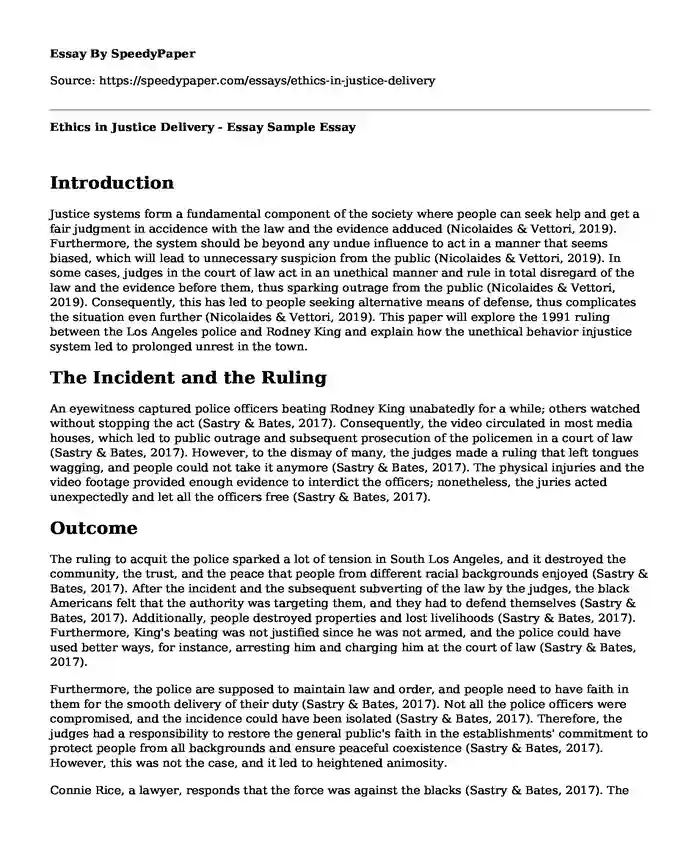Introduction
Justice systems form a fundamental component of the society where people can seek help and get a fair judgment in accidence with the law and the evidence adduced (Nicolaides & Vettori, 2019). Furthermore, the system should be beyond any undue influence to act in a manner that seems biased, which will lead to unnecessary suspicion from the public (Nicolaides & Vettori, 2019). In some cases, judges in the court of law act in an unethical manner and rule in total disregard of the law and the evidence before them, thus sparking outrage from the public (Nicolaides & Vettori, 2019). Consequently, this has led to people seeking alternative means of defense, thus complicates the situation even further (Nicolaides & Vettori, 2019). This paper will explore the 1991 ruling between the Los Angeles police and Rodney King and explain how the unethical behavior injustice system led to prolonged unrest in the town.
The Incident and the Ruling
An eyewitness captured police officers beating Rodney King unabatedly for a while; others watched without stopping the act (Sastry & Bates, 2017). Consequently, the video circulated in most media houses, which led to public outrage and subsequent prosecution of the policemen in a court of law (Sastry & Bates, 2017). However, to the dismay of many, the judges made a ruling that left tongues wagging, and people could not take it anymore (Sastry & Bates, 2017). The physical injuries and the video footage provided enough evidence to interdict the officers; nonetheless, the juries acted unexpectedly and let all the officers free (Sastry & Bates, 2017).
Outcome
The ruling to acquit the police sparked a lot of tension in South Los Angeles, and it destroyed the community, the trust, and the peace that people from different racial backgrounds enjoyed (Sastry & Bates, 2017). After the incident and the subsequent subverting of the law by the judges, the black Americans felt that the authority was targeting them, and they had to defend themselves (Sastry & Bates, 2017). Additionally, people destroyed properties and lost livelihoods (Sastry & Bates, 2017). Furthermore, King's beating was not justified since he was not armed, and the police could have used better ways, for instance, arresting him and charging him at the court of law (Sastry & Bates, 2017).
Furthermore, the police are supposed to maintain law and order, and people need to have faith in them for the smooth delivery of their duty (Sastry & Bates, 2017). Not all the police officers were compromised, and the incidence could have been isolated (Sastry & Bates, 2017). Therefore, the judges had a responsibility to restore the general public's faith in the establishments' commitment to protect people from all backgrounds and ensure peaceful coexistence (Sastry & Bates, 2017). However, this was not the case, and it led to heightened animosity.
Connie Rice, a lawyer, responds that the force was against the blacks (Sastry & Bates, 2017). The biasness presents the officers as extremely unethical since the laws were not different for the whites and the people of color (Sastry & Bates, 2017). It is evident that all these were happening in Los Angeles, and the officers' exoneration raised tension in the town (Sastry & Bates, 2017). Additionally, the blacks' reaction to target the whites was unethical as it was not the best and the only way to address their grievances (Sastry & Bates, 2017). Furthermore, the profiling strained the city dwellers' relationships, which subsequently led to the destruction of harmonious interactions (Sastry & Bates, 2017).
Conclusion
The policemen's action on Mr. King and the subsequent acquittal by the court exposed how unethical behavior in the justice system can contribute to unrest in a community. Also, if individuals feel disgruntled, there are better and justifiable ways to seek justice, and the rage should not turn on other innocent citizens. Moving forward, individuals in justice delivery systems must rule with diligence and deliver justice to all without any favor to ensure peace and tranquility reign.
References
Nicolaides, A., & Vettori, S. (2019). The duty of lawyers: virtue ethics and pursuing a hopeless legal case. The Athens Journal of Law, 149. https://www.athensjournals.gr/law/2019-5-2-4-Nicolaides.pdf
Sastri, A., & Bates, K. G. (2017). When LA erupted in anger: a look back at the Rodney King riots. NPR https://www.npr.org/2017/04/26/524744989/when-la-erupted-in-anger-a-look-back-at-the-rodney-king-riots
Cite this page
Ethics in Justice Delivery - Essay Sample. (2023, Dec 26). Retrieved from https://speedypaper.net/essays/ethics-in-justice-delivery
Request Removal
If you are the original author of this essay and no longer wish to have it published on the SpeedyPaper website, please click below to request its removal:
- Free Essay on the Criminal Justice System
- Ethical-Legal Dilemma in Nursing, Free Paper Sample for You
- Free Essay about the External Societal Factors to Juvenile Delinquency
- Free Essay. Christian Worldview and Ethics
- Essay Sample on The Fresno County Sherriff's Office
- Free Essay Example: Right to Die, Death With Dignity Statutes
- Essay Sample on Elements of Crimes As Proved By the Prosecution
Popular categories





